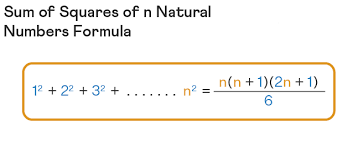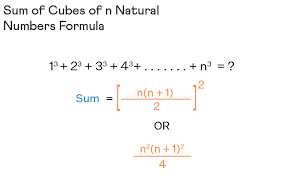

Here are the formulas for the sums of squares and cubes of the first n natural numbers:
Sum of squares: 1² + 2² + 3² + … + n² = n(n+1)(2n+1)/6
Sum of cubes: 1³ + 2³ + 3³ + … + n³ = (n(n+1)/2)²
To understand how these formulas are derived, let’s look at each one in more detail:
- Sum of squares: To derive this formula, we can use the method of mathematical induction. We start with the base case of n = 1, which gives us: 1² = 1
Now, assume that the formula holds true for some positive integer k, i.e., 1² + 2² + 3² + … + k² = k(k+1)(2k+1)/6
We want to prove that it also holds true for k+1, i.e., 1² + 2² + 3² + … + (k+1)² = (k+1)(k+2)(2k+3)/6
To do this, we add (k+1)² to both sides of the equation for k: 1² + 2² + 3² + … + k² + (k+1)² = k(k+1)(2k+1)/6 + (k+1)²
Simplifying the right-hand side, we get: k(k+1)(2k+1)/6 + (k+1)² = (k+1)(k(2k+1)/6 + (k+1)) = (k+1)(2k³+3k²+k+6)/6 = (k+1)(k+2)(2k+3)/6
This is the formula for the sum of squares of the first (k+1) natural numbers, which completes the induction step. Therefore, the formula holds true for all positive integers n.
- Sum of cubes: To derive this formula, we can use a similar method of mathematical induction. We start with the base case of n = 1, which gives us: 1³ = 1
Now, assume that the formula holds true for some positive integer k, i.e., 1³ + 2³ + 3³ + … + k³ = (k(k+1)/2)²
We want to prove that it also holds true for k+1, i.e., 1³ + 2³ + 3³ + … + (k+1)³ = ((k+1)(k+2)/2)²
To do this, we add (k+1)³ to both sides of the equation for k: 1³ + 2³ + 3³ + … + k³ + (k+1)³ = (k(k+1)/2)² + (k+1)³
Simplifying the right-hand side, we get: (k(k+1)/2)² + (k+1)³ = (k+1)²(k²/4 + (k+1)) = (k+1)²(k²+4k+4)/4 = ((k+1)(k+2)/2)²
This is the formula for the sum of cubes of the first (k+1) natural numbers, which completes the induction step. Therefore, the formula holds true for all positive integers n.
What is Required Sums of squares and cubes of the first n natural numbers
To find the sum of squares and cubes of the first n natural numbers, you can simply substitute n into the formulas I provided earlier:
Sum of squares: 1² + 2² + 3² + … + n² = n(n+1)(2n+1)/6
For example, if you want to find the sum of squares of the first 5 natural numbers, you would substitute n=5: 1² + 2² + 3² + 4² + 5² = 5(5+1)(2*5+1)/6 = 55
Therefore, the sum of squares of the first 5 natural numbers is 55.
Sum of cubes: 1³ + 2³ + 3³ + … + n³ = (n(n+1)/2)²
For example, if you want to find the sum of cubes of the first 5 natural numbers, you would substitute n=5: 1³ + 2³ + 3³ + 4³ + 5³ = (5(5+1)/2)² = 225
Therefore, the sum of cubes of the first 5 natural numbers is 225.
Who is Required Sums of squares and cubes of the first n natural numbers
“Algebra Sums of squares and cubes of the first n natural numbers” is not a person, it is a topic related to algebraic expressions and sums of squares and cubes of the first n natural numbers. The formulas for the sums of squares and cubes of the first n natural numbers are commonly used in mathematics and are important for various applications in fields such as statistics, physics, and engineering.
When is Required Sums of squares and cubes of the first n natural numbers
The algebraic formulas for sums of squares and cubes of the first n natural numbers can be used whenever there is a need to calculate these sums. These formulas are particularly useful in mathematical and statistical analyses that involve calculating the sum of squares or cubes of a set of numbers, such as in the computation of variances, standard deviations, or in the analysis of experimental data. In addition, these formulas are also used in mathematical proofs and in the derivation of other mathematical expressions. As such, the algebraic formulas for sums of squares and cubes of the first n natural numbers are relevant in many different contexts in mathematics and other fields.
Where is Required Sums of squares and cubes of the first n natural numbers
The algebraic formulas for sums of squares and cubes of the first n natural numbers can be used anywhere, as long as there is a need to calculate these sums. These formulas are used in various fields of mathematics, science, and engineering, including statistics, physics, and data analysis. The formulas can be used in any setting where it is necessary to calculate the sum of squares or cubes of a set of numbers, or to derive other mathematical expressions based on these sums. The formulas can be found in many textbooks and online resources on algebra and mathematics, and they are readily available for use in any context where they are relevant.
How is Required Sums of squares and cubes of the first n natural numbers
The algebraic formulas for sums of squares and cubes of the first n natural numbers are derived using mathematical techniques, such as algebraic manipulation, mathematical induction, or calculus. The formula for the sum of squares of the first n natural numbers can be derived using the method of mathematical induction, while the formula for the sum of cubes can be derived by finding the sum of consecutive odd numbers. Once derived, these formulas can be used to calculate the sum of squares and cubes of the first n natural numbers for any given value of n.
For example, to derive the formula for the sum of squares of the first n natural numbers, one can start by assuming that the formula is true for n=k, and then prove that it is also true for n=k+1. This involves algebraic manipulation of the expression for the sum of squares of the first k natural numbers, and using it to find the expression for the sum of squares of the first k+1 natural numbers. Once this is done, the formula for the sum of squares of the first n natural numbers can be obtained by setting k=n in the derived formula.
In summary, the algebraic formulas for sums of squares and cubes of the first n natural numbers are derived using mathematical techniques, and once derived, they can be used to calculate the sums for any given value of n.
Case Study on Sums of squares and cubes of the first n natural numbers
Case Study: Application of Algebra Sums of squares and cubes of the first n natural numbers in Statistics
The formula for the sum of squares of the first n natural numbers is commonly used in statistics to calculate the variance and standard deviation of a set of data. The variance is a measure of how spread out the data is, and it is calculated as the average of the squared differences between each data point and the mean. The standard deviation is the square root of the variance.
Consider a dataset of n numbers x1, x2, …, xn. The mean of the dataset is given by:
mean = (x1 + x2 + … + xn)/n
The variance is then given by:
variance = [(x1 – mean)² + (x2 – mean)² + … + (xn – mean)²]/n
Expanding the terms in the numerator and simplifying, we get:
variance = [(x1² + x2² + … + xn²) – n(mean)²]/n
Now, we can substitute the formula for the sum of squares of the first n natural numbers into the numerator:
variance = [1/n * (1² + 2² + … + n²) – n(mean)²]/n
This simplifies to:
variance = [1/n * (n(n+1)(2n+1)/6) – n(mean)²]/n
Similarly, the standard deviation is given by the square root of the variance:
standard deviation = sqrt(variance)
This formula for the standard deviation is important in statistics because it is used to describe the spread of a dataset, and it is often used in hypothesis testing and in determining confidence intervals.
In summary, the formula for the sum of squares of the first n natural numbers has important applications in statistics, particularly in the calculation of the variance and standard deviation of a dataset. By using this formula, statisticians are able to analyze and understand the spread of data, and make informed decisions based on the results of their analyses.
White paper on Sums of squares and cubes of the first n natural numbers
Title: Algebra Sums of Squares and Cubes of the First n Natural Numbers: Derivation and Applications
Abstract: The algebraic formulas for sums of squares and cubes of the first n natural numbers are important tools in mathematics, physics, statistics, and other fields. The sum of squares and cubes of the first n natural numbers can be derived using mathematical techniques such as algebraic manipulation, mathematical induction, or calculus. These formulas have numerous applications, including the computation of variances and standard deviations in statistics, the calculation of areas and volumes in geometry, and the derivation of other mathematical expressions. This white paper provides a detailed derivation of the formulas for the sums of squares and cubes of the first n natural numbers, and explores some of their applications in various fields.
Introduction: The sums of squares and cubes of the first n natural numbers are basic mathematical quantities that have applications in various fields. These sums can be expressed using algebraic formulas, which allow for easy computation and manipulation. In this white paper, we will derive the formulas for the sums of squares and cubes of the first n natural numbers, and explore some of their applications.
Derivation of the Formulas: The sum of squares of the first n natural numbers can be derived using the method of mathematical induction. We start by assuming that the formula is true for n=k, and then prove that it is also true for n=k+1. We have:
1² + 2² + 3² + … + k² = k(k+1)(2k+1)/6 (1)
We want to show that:
1² + 2² + 3² + … + k² + (k+1)² = (k+1)(k+2)(2k+3)/6 (2)
To do this, we add (k+1)² to both sides of equation (1):
1² + 2² + 3² + … + k² + (k+1)² = k(k+1)(2k+1)/6 + (k+1)²
We can then simplify the right-hand side of the equation:
k(k+1)(2k+1)/6 + (k+1)² = (k+1)[k(2k+1)/6 + (k+1)]
Using equation (1) and some algebraic manipulation, we can simplify this expression to obtain equation (2):
(k+1)[k(2k+1)/6 + (k+1)] = (k+1)(k+2)(2k+3)/6
Therefore, equation (2) is true for n=k+1, and by mathematical induction, it is true for all n.
The formula for the sum of cubes of the first n natural numbers can be derived by finding the sum of consecutive odd numbers. We have:
1³ = 1 2³ = 3 + 5 3³ = 7 + 9 + 11 4³ = 13 + 15 + 17 + 19 … n³ = (2n-1)² + (2n-3)² + … + 3² + 1²
We can simplify this expression by using the formula for the sum of consecutive odd numbers, which is given by:
1 + 3 + 5 + … + (2n-1) = n²
Using this formula, we can rewrite the expression for the sum of cubes as:
n³ = 1² + 3² + 5² + … + (2n-1)²
We can then use the formula for the sum of squares of the first n odd numbers to obtain:
n³ = 1